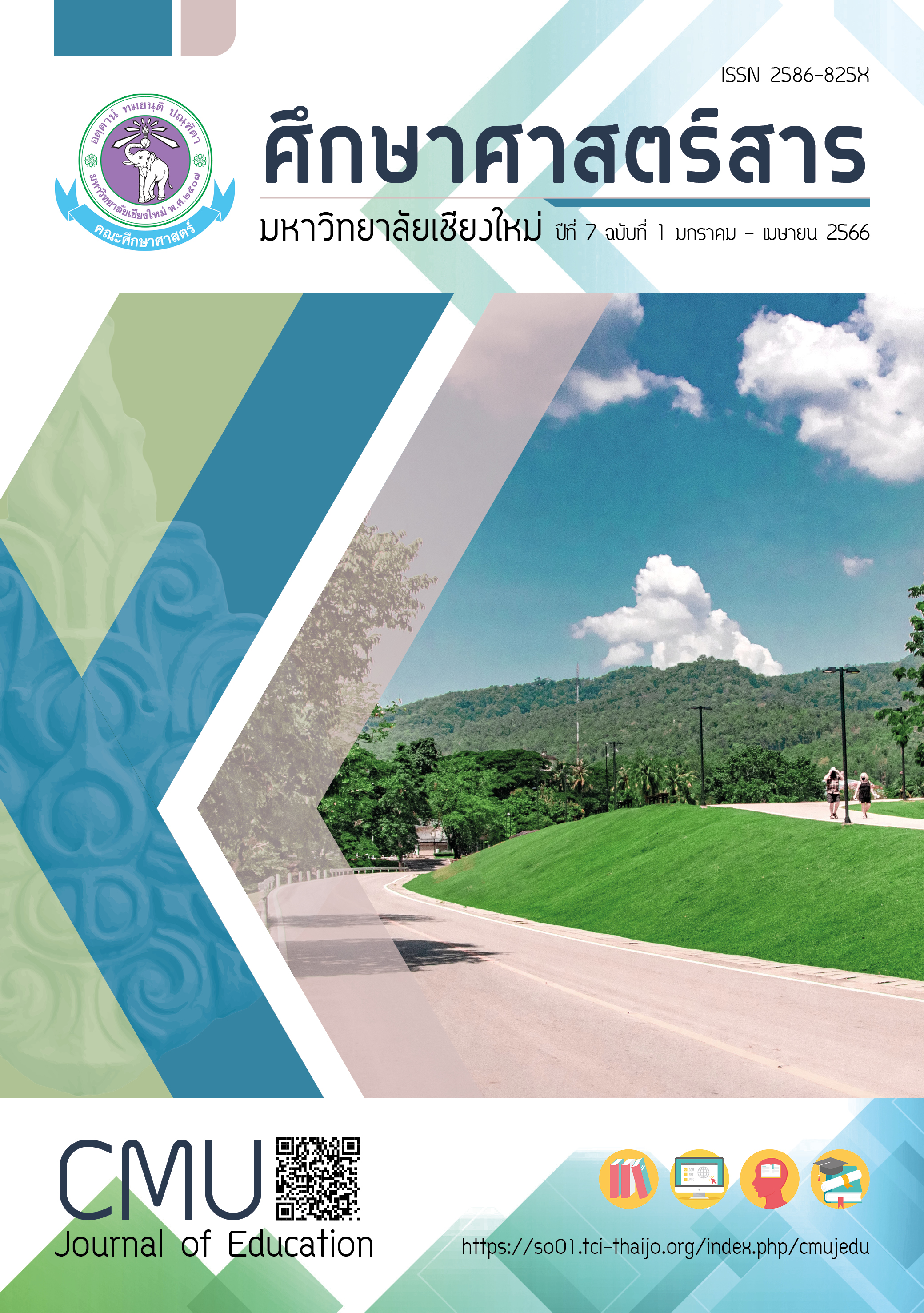แนวทางการออกแบบกิจกรรมสะเต็มและแนวคิดบูรณาการสะเต็มศึกษาของครูประจำการ เมื่อเข้าร่วมประสบการณ์เชิงรุก
Main Article Content
บทคัดย่อ
แม้ว่าการบูรณาการสะเต็มศึกษาเป็นกลไกพื้นฐานในการทำงานทางสะเต็มศึกษา แต่พบครูประจำการบางส่วนไม่สามารถออกแบบการเรียนรู้ได้สอดคล้องกับการทำงานทางสะเต็มศึกษาได้ งานวิจัยนี้จึงวิเคราะห์แนวทางการออกแบบกิจกรรมสะเต็มศึกษาของครูประจำการ และเปรียบเทียบการเปลี่ยนแปลงแนวคิดการบูรณาการสะเต็มศึกษาเมื่อได้รับประสบการณ์เชิงรุกที่แตกต่างกัน ผู้เข้าร่วมการวิจัยคือครูประจำการ 33 คน ได้รับประสบการณ์เชิงรุกผ่านการอบรมเชิงปฏิบัติการเพื่อพัฒนาแผนสะเต็มศึกษา และเพื่อออกแบบกิจกรรมสะเต็มศึกษา 18 และ 15 คน ตามลำดับ ผู้วิจัยวิเคราะห์ข้อมูลจากแบบบันทึกการออกแบบกิจกรรมสะเต็มศึกษาและแบบบันทึกภาคสนาม โดยใช้การวิเคราะห์ข้อมูลเชิงพรรณนา และวิเคราะห์ข้อมูลจากแบบสอบถามความเข้าใจการบูรณาการสะเต็มศึกษา โดยวิเคราะห์ความถี่และร้อยละของความถี่ของคำตอบ ผลวิจัยพบว่า การสะท้อนคิดแบบชัดแจ้งที่มุ่งเน้นมุมมองในการบูรณาการศาสตร์ของผู้เข้าร่วมการวิจัย ตลอดจนการร่วมประสบการณ์เชิงรุก ส่งผลต่อการพัฒนาความเข้าใจเป้าหมายของสะเต็มศึกษาและการสร้างนวัตกรรม หลังเข้าร่วมการอบรมแล้ว ผู้เข้าร่วมวิจัยทั้งสองกลุ่มมีแนวโน้มการเปลี่ยนแปลงแนวคิดสะเต็มศึกษาสอดคล้องกับธรรมชาติของศาสตร์ที่นำมาบูรณาการ งานวิจัยครั้งต่อไป ผู้วิจัยอาจติดตามผลการปฏิบัติการสอนสะเต็มศึกษาของครูหลังจากได้รับประสบการณ์เชิงรุกที่เน้นการบูรณาการศาสตร์ทางสะเต็ม
Article Details

อนุญาตภายใต้เงื่อนไข Creative Commons Attribution-NonCommercial-NoDerivatives 4.0 International License.
หากผู้เสนอบทความมีความจำเป็นเร่งด่วนในการตีพิมพ์โปรดส่งลงตีพิมพ์ในวารสารฉบับอื่นแทน โดยกองบรรณาธิการจะไม่รับบทความหากผู้เสนอบทความไม่ปฏิบัติตามเงื่อนไขและขั้นตอนที่กำหนดอย่างเคร่งครัด ข้อมูลของเนื้อหาในบทความถือเป็นลิขสิทธิ์ของ Journal of Inclusive and Innovative Education คณะศึกษาศาสตร์ มหาวิทยาลัยเชียงใหม่
เอกสารอ้างอิง
กรกนก เลิศเดชาภัทร และชาตรี ฝ่ายคำตา. (2564). กระบวนการออกแบบเชิงวิศวกรรม: กลไกขับเคลื่อนกิจกรรมสะเต็ม. วารสารหน่วยวิจัยวิทยาศาสตร์ เทคโนโลยี และสิ่งแวดล้อมเพื่อการเรียนรู้, 12(2), 356-268.
สุทธิดา จำรัส มนต์นภัส มโนการณ์ และจุฬารัตน์ ธรรมประทีป. (2562). มุมมองทฤษฎีระบบของรูปแบบการพัฒนาวิชาชีพครูสะเต็ม. วารสารศึกษาศาสตร์ มสธ., 12(1), 147-167.
อัศวนนทปกรณ์ ธเนศวีรภัทร. (2563). การเรียนรู้วิทยาศาสตร์ผ่านการออกแบบเชิงวิศวกรรมในบริบทชุมชน. ใน สุรภี
รุโจปการ (บรรณาธิการ), ศาสตร์ สอน สื่อ สุข รวมบทความวิชาการด้านหลักสูตรและการสอน (น. 119-133). กรุงเทพมหานคร: สำนักพิมพ์จุฬาลงกรณ์มหาวิทยาลัย.
Baxter, P., & Jack, S. (2008). Qualitative case study methodology: Study design and implementation for novice researchers. The Qualitative Report, 13(4), 544-559.
Bybee, R. W. (2013). The case for STEM education: Challenges and opportunities. Virginia, NSTA.
Christian, K.B., Kelly, A.M. & Bugallo, M.F. (2021) NGSS-based teacher professional development to implement engineering practices in STEM instruction. International Journal of STEM Education 8(21), 1-18.
Dare, E. A., Keratithamkul, K., Hiwatig, B. M., & Li, F. (2021). Beyond Content: The Role of STEM Disciplines, Real-World Problems, 21st Century Skills, and STEM Careers within Science Teachers’ Conceptions of Integrated STEM Education. Education Sciences, 11(11), 737-758.
Faikhamta, C., Lertdechapat, K., & Prasoblarb, T. (2020). The Impact of a PCK-based professional development program on science teachers’ ability to teaching STEM. Journal of Science and Mathematics Education in Southeast Asia, 43. 1-22.
Kelley, T. R., & Knowles, J. G. (2016). A conceptual framework for integrated STEM education. International Journal of STEM Education, 3(1), 1-11.
King, F. (2014). Evaluating the impact of teacher professional development: an evidence-based framework. Professional Development in Education, 40(1), 89-111.
Li, Y. (2014). International Journal of STEM Education-a platform to promote STEM education and research worldwide. International Journal of STEM Education, 1(1), 1-2.
Loucks-Horsley, S., Stiles, K. E., Mundry, S., Love, N., & Hewson, P. W. (2010). Designing professional development for teachers of science and mathematics (3rd ed.). California, Corwin.
National Research Council (NRC). (2013). Next Generation Science Standards: For States, By States. Washington, DC: The National Academies Press.
Ring, E. A., Dare, E. A., Crotty, E. A., & Roehrig, G. H. (2017). The evolution of teacher conceptions of STEM education throughout an intensive professional development experience. Journal of Science Teacher Education, 28(5), 444-467.
Roehrig, G. H., Dare, E. A., Ellis, J. A., & Ring-Whalen, E. (2021). Beyond the basics: a detailed conceptual framework of integrated STEM. Disciplinary and Interdisciplinary Science Education Research, 3(1), 1-18.
Sanders, M. (2009). STEM, STEM education, STEMmania. The Technology Teacher, 68(4), 20–26.
Shernoff, D. J., Sinha, S., Bressler, D. M., & Ginsburg, L. (2017). Assessing teacher education and professional development needs for the implementation of integrated approaches to STEM education. International Journal of STEM Education, 4(13), 1-16.
Stohlman, M., Moore, T. J., & Roehrig, G. H. (2012). Considerations for teaching integrated STEM education. Journal of Pre-College Engineering Education Research, 2(1), 28-34.


